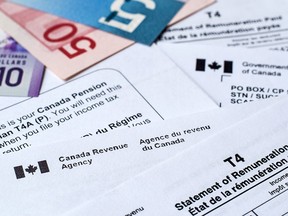Kim Moody: CRA’s headcount has jumped almost 50% since 2015, but service still lacking
Reviews and recommendations are unbiased and products are independently selected. Postmedia may earn an affiliate commission from purchases made through links on this page.
Article content
Last week, The Fraser Institute released its 2024 edition of its publication Taxes versus the Necessities of Life: The Canadian Consumer Tax Index, which tracks the total tax bill of the average Canadian family from 1961 to 2023. It’s a fascinating read to see how much the average Canadian pays in taxes — not just income tax, but other taxes like property taxes, GST, carbon taxes and indirect taxes, as well.
Advertisement 2
Article content
Yes, some loud voices on social media — especially some left-of-centre economists and partisans — scream loudly that this report is flawed. Mainly, from what I can tell, they don’t believe that indirect taxes — such as corporate taxes — should be included in the analysis (and also that they simply don’t like the Institute for continuously calling out fiscal irresponsibility) but I actually think it is well done, because any taxes, even those borne indirectly, add to a person’s cost of living. At a minimum, it is good food for thought.
Some highlights from the report:
- “In 2023, the average Canadian family earned an income of $109,235 and paid in total taxes equalling $46,988”
- “In other words, the average Canadian family spent 43.0 per cent of its income on taxes compared to 35.6 per cent on basic necessities.”
- “This is a dramatic shift since 1961 when the average Canadian family spent much less of its income on taxes (33.5 per cent) than the basic necessities (56.5 per cent). Taxes have grown much more rapidly than any other single expenditure for the average Canadian family.”
- “Since 1961, the average Canadian family’s total tax bill has increased nominally by 2,705 per cent, dwarfing increases in annual housing costs (2,006 per cent), clothing (478 per cent) and food (901 per cent).”
Article content
Advertisement 3
Article content
Absorb those statistics for even 30 seconds. The fact that the average Canadian family now pays — and has for a while — more in taxes than the necessities of life is mind-boggling. When I speak on this subject at lectures or conferences, I often test the audience to see if they know what the average Canadian family pays in taxes compared to the basic necessities of life. The guesses I get are usually way off. When the actual right answer is given, there are often surprised looks and some audible gasps. However, when the logic is explained in more detail, the audience mostly understands.
The simple fact is that the average Canadian family has less disposable income in their pockets than ever and increased overall taxes is a big reason for this. This leaves less money for things such as savings, entertainment, travel and better living arrangements.
The spillover effect is damaging. For example, with less disposable income, some may not be able to purchase a home for quite some time if ever. While the root cause of Canada’s current housing shortage is mostly self-inflicted given very poor federal immigration policies (we’re taking in far more immigrants than we’re able to house), less disposable income for Canadians is also a contributing factor especially with increased prices (since demand exceeds supply).
Advertisement 4
Article content
In my view, policy makers need to pay close attention to studies and tracking like that of the recent report. It’s time to return to the 1960s and 1980s, when, rightfully, Canadians spent more on the necessities of life than to support bloated governments. However, it would be a monumental effort to get back to that scenario.
It starts with significantly reduced government spending. The cuts should be swift, deep and big enough to enable the federal government to bring down personal income tax rates across the board to a more reasonable and competitive level. This should all be part of a significant re-think of our current personal, business and sales tax regimes. And we should be bold in our thinking.
Overall, Canadians need to genuinely reflect on whether they are getting good value for their tax dollars. Yes, I understand that taxes are one of the prices we pay for a stable country that provides critical infrastructure and support for its most vulnerable citizens. But there are limits. Another recent Fraser Institute poll on this subject found that 74 per cent of Canadians surveyed feel that the average family is being over-taxed by federal, provincial and local governments. I concur.
Advertisement 5
Article content
For example, the population of the federal public service in 2015 was 257,034 people. As of March 31, 2024, it has grown to 367,772. That’s an increase of 110,738 or 43.1 per cent in nine years, far above the 15.2 per cent increase in the overall population of Canada during that time period. That’s incredible.
Taking this analysis a bit further, the Canada Revenue Agency’s headcount during 2015 was 40,059 people. For 2024, it’s 59,155 or a 47.6 per cent increase.
The CRA has an important job to do in administrating Canada’s tax legislation. However, have Canadians received good value for such a dramatic increase in the CRA headcount? My opinion is an emphatic “no.” I say this because of my experiences of long telephone wait times to discuss routine matters, numerous and lengthy delays in processing objections, delays in the processing of routine credits such as foreign tax credits, audits for matters that are wholly ridiculous, along with the frustrating incompetence of many new hires.
Former United States President Ronald Reagan once famously said: “The government’s view of the economy can be summed up in a few short phrases. If it moves, tax it. If it keeps moving, regulate it. And if it stops moving it, subsidize it.”
Advertisement 6
Article content
There’s a lot of wisdom in that quote.
Canada, it’s well past time to demand more value for our taxation dollars.
Recommended from Editorial
-

Estonia has a way Canada can implement better taxation
-

Canadian politicians need better financial training
-

Time to stem the tide of successful people leaving Canada
Kim Moody, FCPA, FCA, TEP, is the founder of Moodys Tax/Moodys Private Client, a former chair of the Canadian Tax Foundation, former chair of the Society of Estate Practitioners (Canada) and has held many other leadership positions in the Canadian tax community. He can be reached at kgcm@kimgcmoody.com and his LinkedIn profile is https://www.linkedin.com/in/kimgcmoody.
_____________________________________________________________
If you like this story, sign up for the FP Investor Newsletter.
_____________________________________________________________
Bookmark our website and support our journalism: Don’t miss the business news you need to know — add financialpost.com to your bookmarks and sign up for our newsletters here.
Article content
























Discussion about this post